Cats
Cats Have Coconut: Safe Consumption Guide
Curious about cats and coconut? Find out how to safely introduce this tropical treat to your feline friend in our guide!

Cats can safely enjoy coconut, but it is important to take precautions for their well-being. Coconut water and the high-fat content in the flesh can lead to digestive issues such as diarrhea and vomiting. Before giving coconut to your feline friend, it is advisable to consult a vet. Remember that moderation is key, as too much coconut can cause electrolyte imbalances and health risks. You may consider using coconut oil for its benefits on skin, coat, and digestion. Keep an eye out for any adverse reactions or signs of overconsumption. It is recommended to explore other healthy alternatives for variety. For a comprehensive guide on safe coconut consumption for cats, continue to explore the benefits and precautions involved.
Key Takeaways
- Consult a vet before giving coconut.
- Start with small amounts to monitor reactions.
- Avoid coconut water due to high potassium.
- Introduce coconut meat gradually for digestion.
- Watch for signs of overconsumption like vomiting.
Coconut Safety for Cats
When considering coconut safety for cats, it's crucial to be aware of potential risks associated with their consumption. While coconut itself is non-toxic to cats, it's vital to exercise caution.
The ASPCA advises that high oil content in coconut products can lead to diarrhea, vomiting, and stomach upset in our feline friends. Additionally, coconut water should be given sparingly to cats due to its high electrolyte levels, especially potassium, which can affect their health if consumed excessively.
Although small amounts of coconut flesh may not cause serious harm, it's generally best to avoid it in a cat's diet to prevent any potential digestive issues. Consulting a veterinarian before introducing coconut or coconut products to cats is highly recommended to guarantee their safety and well-being.
Nutritional Value of Coconut

Coconut offers a plethora of nutritional benefits for cats, including high levels of healthy fats that provide essential energy in the form of medium-chain triglycerides. These important fats are critical for cats' overall well-being, supporting their energy levels and aiding in nutrient absorption.
Along with fats, coconut also contains protein, essential for tissue growth in our feline friends. This protein helps in maintaining muscle mass and promoting healthy organ function.
In addition to fats and protein, coconut is rich in iron, a crucial mineral that promotes red blood cell production, ensuring proper oxygen transport throughout the body. Moreover, the high manganese content in coconut supports bone and joint health in cats, keeping their skeletal system strong and agile.
When incorporated into their diet in moderation, coconut can be a beneficial addition for cats, providing a range of essential nutrients that contribute to their overall health and vitality.
Coconut Meat Considerations

When contemplating coconut meat for your feline companion, it's crucial to comprehend its nutritional value breakdown, potential digestive issues, and the significance of moderation and portion control.
By being mindful of these points, you can guarantee that your cat enjoys coconut meat safely and without any adverse effects.
Remember to introduce this treat gradually and keep a close eye on how your cat responds to it to assure their well-being.
Nutritional Value Breakdown
To understand the nutritional value breakdown of coconut meat for cats, it's essential to recognize its high content of healthy fats. Coconut meat is rich in medium-chain triglycerides, providing a source of energy for our feline friends.
Additionally, it contains essential proteins vital for tissue growth and repair in cats. The iron present in coconut meat supports red blood cell production, contributing to overall health.
Moreover, the high manganese content in coconut meat promotes bone and joint health in cats. Remember, moderation is key when incorporating coconut meat into your cat's diet to prevent potential digestive issues and weight gain.
Potential Digestive Issues
Experiencing digestive issues in cats can be a result of the high-fat content found in coconut meat. When considering coconut meat for your feline friend, it's important to be aware of the potential digestive issues that may arise. Here are some key points to keep in mind:
- High Fat Content: Coconut meat is rich in fat, which can lead to stomach upset in some cats.
- Stomach Upset: Cats may experience discomfort or bloating after consuming coconut meat.
- Diarrhea: Excessive consumption of coconut meat can cause diarrhea in cats.
- Vomiting: Some cats may vomit if they eat too much coconut meat at once.
Always monitor your cat's reaction to coconut meat, introduce it gradually, and seek veterinary advice if any digestive issues occur.
Moderation and Portion Control
Moderation and portion control are essential factors to keep in mind when incorporating coconut meat into a cat's diet due to its high fat content. Cats should only have small amounts of coconut meat as an occasional treat to prevent digestive issues such as an upset stomach or pancreatitis. To help you understand better, let's break it down in a relatable way:
| Coconut Meat | Portion Control |
|---|---|
| Small Amounts | Occasional Treat |
| High Fat Content | Digestive Health |
| Monitor Reactions | Prevent Upset Stomach |
Coconut Water Cautions

Cats should steer clear of coconut water due to its high potassium content, which can pose health risks by disrupting their electrolyte balance. Here are some reasons why coconut water isn't the best choice for your feline friend:
- Hyperkalemia Risk: The abundance of potassium in coconut water can lead to hyperkalemia in cats, impacting their blood acidity and heart function.
- Electrolyte Imbalance: Feeding coconut water to cats can throw off their electrolyte balance, potentially causing health issues.
- Better Alternatives: Opt for safer hydration options for your cat to safeguard their well-being, steering clear of coconut water.
- Health Concerns: The potential health risks associated with the high potassium levels in coconut water make it unsuitable for feline consumption.
It's essential to prioritize your cat's health by avoiding coconut water and choosing more suitable alternatives for their hydration needs.
Coconut Milk Recommendations

When considering coconut milk for feline consumption, it's important to prioritize options without added sugars and to monitor fat content for weight management. Cats enjoy the creamy texture of coconut milk, but it's vital to choose varieties that are free from sugars and additives.
High levels of fat and calories in coconut milk can lead to weight gain in cats, so moderation is key. Opt for plain coconut milk without any extra ingredients to guarantee your feline friend's health and well-being. Keep a close eye on the fat content when incorporating coconut milk into your cat's diet to prevent any unwanted weight gain.
Coconut Oil Usage

Considering the benefits of coconut oil for cats, it can be a valuable addition to their grooming routine, aiding in maintaining a healthy coat and potentially addressing hairball issues. Here are some important points to keep in mind when using coconut oil on your feline friend:
- Consult a Vet: Before integrating coconut oil into your cat's regimen, it's essential to seek advice from a veterinarian, especially if your cat has existing skin or coat concerns.
- Moderation is Key: Use coconut oil in small amounts as excessive consumption can lead to digestive issues due to its high fat content.
- Topical Application: Coconut oil should only be applied externally on your cat's coat and not ingested to prevent potential health problems.
- Monitor for Reactions: Keep a close eye on your cat for any adverse reactions when using coconut oil and discontinue use if any issues arise to guarantee your cat's well-being.
Introducing coconut oil in the right way can contribute positively to your cat's overall health and well-being.
Benefits of Coconut Oil

Coconut oil offers several benefits for cats, including promoting healthy skin, boosting the immune system, and supporting digestion.
Its moisturizing properties can enhance the coat health of felines and reduce hairballs.
The antibacterial and antifungal properties of the oil can also contribute to the overall skin health of cats.
Healthy Skin Benefits
To enhance a cat's skin health, incorporating coconut oil into their grooming routine can provide numerous benefits. Here's how coconut oil can help your furry friend's skin:
- Softens tangles and promotes a healthy coat.
- Improves skin health by moisturizing and reducing inflammation.
- Aids in reducing dryness, flakiness, and itchiness.
- Benefits cats with skin conditions like dermatitis or allergies due to its antimicrobial and antioxidant properties.
Boosts Immune System
Boosting a cat's immune system can be effectively achieved through the regular consumption of coconut oil. This is thanks to its rich content of lauric acid and medium-chain fatty acids. Lauric acid in coconut oil possesses antibacterial, antiviral, and antifungal properties, aiding in fighting off harmful invaders and supporting overall immune health.
The medium-chain fatty acids found in coconut oil contribute to a balanced gut environment, promoting the growth of beneficial bacteria that play a vital role in immune function. Additionally, the antioxidants present in coconut oil help protect cells from damage and enhance the body's ability to respond to infections and diseases.
Supports Digestion
Improving feline digestion can be supported through the incorporation of coconut oil into their diet. Here are a few reasons why coconut oil is beneficial for your cat's digestive health:
- Promotes healthy gut flora: Coconut oil aids in promoting a balanced gut environment for efficient digestion.
- Enhances nutrient absorption: The medium-chain fatty acids in coconut oil help cats absorb nutrients more effectively.
- Supports a balanced digestive system: Its antimicrobial properties assist in maintaining a healthy gut for overall well-being.
- Alleviates digestive issues: Adding coconut oil can help with constipation and promote regular bowel movements in cats.
Coconut Oil for Coat Health

Enhancing your cat's coat health can be achieved through the use of coconut oil. Coconut oil is a natural remedy that provides essential fatty acids to promote a glossy and shiny coat in cats. By applying coconut oil topically, you can help with dry skin, tangles, and overall coat health. The moisturizing properties of coconut oil are especially beneficial for cats with skin conditions or dry fur, leading to a softer and healthier coat over time. To give you a better idea of the benefits of using coconut oil for your cat's coat health, here is a visual representation in the table below:
| Benefits of Coconut Oil for Cats' Coat Health | |
|---|---|
| Provides essential fatty acids | Promotes a glossy and shiny coat |
| Helps with dry skin and tangles | Improves overall coat health |
| Moisturizes skin and fur | Benefits cats with skin conditions or dry fur |
Ear Cleaning With Coconut Oil

To maintain your cat's ear health, consider incorporating coconut oil into your routine for gentle and effective ear cleaning. Here are four reasons why coconut oil is a fantastic option for keeping your feline friend's ears clean and healthy:
- Softens wax and debris: Coconut oil works wonders in softening wax and debris in your cat's ears, making it easier to remove and preventing buildup.
- Soothes irritation: Its moisturizing properties help soothe itchy or irritated ears, providing relief to your cat.
- Antibacterial and antifungal properties: Coconut oil's natural antibacterial and antifungal properties can help prevent ear infections, keeping your cat's ears healthy.
- Promotes overall ear health: Regular ear cleaning with coconut oil not only cleans but also promotes overall ear health and hygiene in cats.
Using a small amount of coconut oil on a cotton ball or swab can be a simple yet effective way to make sure your cat's ears stay clean and healthy.
Signs of Coconut Overconsumption
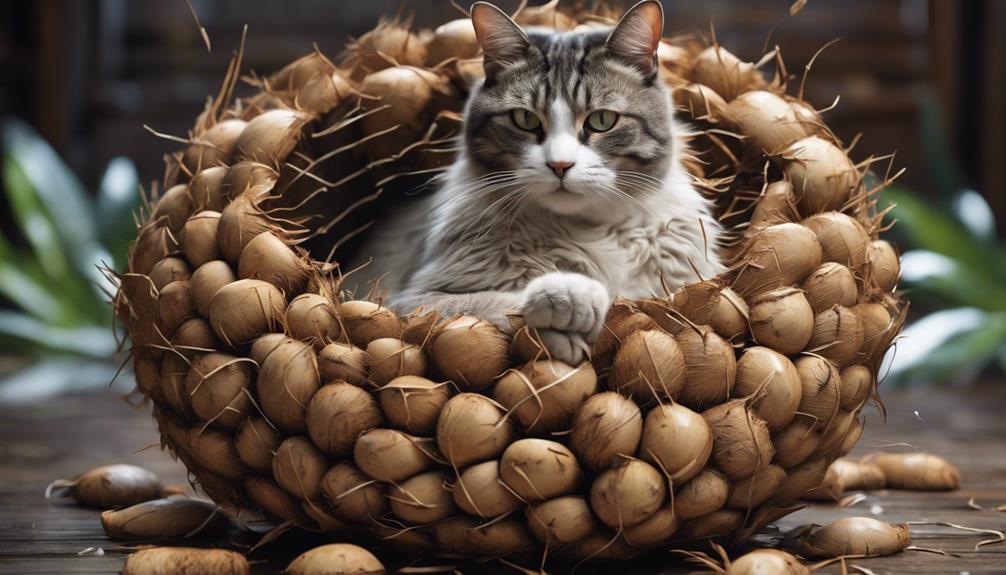
When cats consume excessive amounts of coconut, they may exhibit symptoms such as vomiting, diarrhea, and stomach upset. Changes in behavior, like hiding or decreased playfulness, can also signal that a cat has had too much coconut. It's important to be vigilant for signs of coconut overconsumption in our feline friends. If a cat shows any of these symptoms, immediate veterinary attention is necessary to prevent complications and guarantee their well-being.
Monitoring for adverse reactions is key to maintaining a cat's health when it comes to coconut consumption. If your cat seems uncomfortable or experiences gastrointestinal issues after consuming coconut, it's crucial to act promptly. Being proactive in recognizing these signs can make a significant difference in your cat's overall health. Remember, our furry companions rely on us to look out for their well-being, so staying informed and attentive to any signs of coconut overconsumption is essential for their care.
Managing Coconut-Related Symptoms

Recognizing symptoms of vomiting, diarrhea, and stomach upset in cats after consuming coconut is essential for effectively managing coconut-related issues. When dealing with adverse reactions in your feline friend, follow these steps:
- Observe Behavior Changes: Keep an eye out for signs like lethargy or decreased appetite, which could indicate a negative response to coconut consumption.
- Monitor Closely: Stay vigilant for any unusual symptoms and be ready to take action promptly if you notice anything concerning.
- Seek Veterinary Help: If your cat displays adverse reactions to coconut, don't hesitate to seek immediate veterinary attention for professional guidance.
- Provide Information: When visiting the vet, bring a sample of the coconut product your cat consumed. This can aid in diagnosing and treating the issue effectively.
Introducing Coconut to Cats

When introducing coconut to your cat, start with small amounts of shredded coconut meat and observe for any digestive issues. It's important to make sure the coconut meat is pure and free from harmful additives or sugars.
Gradually introducing coconut to your cat allows you to gauge their tolerance and preferences, while consulting your veterinarian is essential to address any health concerns.
Benefits of Coconut
Introducing coconut to your feline companion can provide essential minerals and protein that benefit their immune and digestive systems. Here are some benefits of coconut for your cat:
- Hairball Relief: Coconut can help reduce hairballs in cats, making grooming a smoother process.
- Improved Breath: Incorporating coconut into your cat's diet can help freshen their breath naturally.
- Healthy Fats: Coconut contains healthy fats that support your cat's overall health and well-being.
- Nutrient-Rich: Coconut meat is packed with nutrients that can complement your cat's diet when given in moderation.
Serving Size Recommendations
To ensure a smooth transition for your cat's diet, it's advisable to start with a small serving size of coconut, such as a tiny piece of coconut meat. When giving coconut to your cat, it's important to closely observe their reaction and any potential digestive issues.
Gradually increasing the serving size over time allows you to evaluate your cat's tolerance to coconut. Seeking advice from a veterinarian can provide customized recommendations based on your cat's health and dietary requirements.
Keeping the serving size moderate is vital in preventing any digestive upset or weight-related problems in cats. By starting small and monitoring your cat's response, you can introduce coconut safely into their diet and enjoy the potential benefits it may offer.
Potential Side Effects
Potential side effects of introducing coconut to cats may include digestive disturbances such as diarrhea, vomiting, and stomach upset. When we introduce new foods to our feline friends, it's important to be aware of the potential risks involved. Here are some key points to remember:
- Gastrointestinal Upset: Cats may experience diarrhea or vomiting due to coconut's high oil content.
- Discomfort: Symptoms of overconsumption can lead to digestive disturbances and stomach discomfort in cats.
- Behavioral Changes: Adverse reactions might manifest as decreased playfulness or lethargy in your pet.
- Close Monitoring: It's vital to observe your cat closely for any signs of adverse reactions when introducing new foods like coconut.
Being attentive to your cat's well-being is paramount when exploring different dietary options.
Offering Coconut Alternatives

Consider cooked meat, specialty cat treats, catnip, or canned pumpkin as safer alternatives to coconut for your feline companion's well-being. While coconut can pose risks for some cats, these alternative options can provide tasty and safe alternatives.
When choosing cat food or treats, opt for varieties that are specifically formulated for feline dietary needs to guarantee your cat receives all the essential nutrients. Introduce new treats gradually and in moderation to prevent any potential digestive issues.
Prioritizing your cat's importance and health is vital, especially if your cat has a sensitive stomach or underlying health conditions that could be exacerbated by coconut consumption. Remember, consulting your veterinarian before making any changes to your cat's diet is always a wise decision to safeguard their well-being.
Healthy Coconut Treats for Cats

When it comes to healthy coconut treats for cats, we can't overlook the benefits they offer. From the goodness of coconut to the advantages of coconut oil and even the option of coconut milk, there's a range of tasty and nutritious options to ponder for our feline friends.
These treats not only taste great but also provide essential nutrients that can contribute to our cats' well-being.
Benefits of Coconut
We find that incorporating coconut into a cat's diet can enhance their overall well-being by providing essential minerals and healthy fats. Here are some benefits of coconut for your feline friend:
- Boosts Immune System: The essential minerals in coconut can help strengthen your cat's immune system.
- Aids Digestion: Coconut can reduce hairballs and improve bad breath in cats.
- Healthy Addition: Coconut meat is a safe and healthy treat for cats when fed in moderation.
- Easy Consumption: Shredded coconut meat is the recommended form to offer cats for easy eating pleasure.
Coconut Oil Benefits
To enhance your cat's well-being, consider incorporating coconut oil as a healthy treat option rich in essential fatty acids and medium-chain triglycerides. Cats Have Coconut mentions that coconut oil can provide essential fatty acids that support skin and coat health in cats.
Additionally, the medium-chain triglycerides found in coconut oil can aid in digestion and nutrient absorption for our feline friends. The antimicrobial properties of coconut oil may also benefit a cat's oral health and immune system. When applied topically, coconut oil can help soothe dry skin, reduce inflammation, and even promote wound healing in cats.
Offering small amounts of coconut oil as an occasional treat not only provides variety but also potential health benefits to your beloved cat.
Coconut Milk Options
Considering its creamy texture and potential benefits for cats, exploring different coconut milk options can offer a healthy and enticing treat alternative for your feline companion.
When choosing coconut milk for your cat, keep in mind the following:
- Opt for unsweetened varieties to guarantee safety for your cat.
- Moderation is key due to high fat and calorie content.
- Watch for digestive issues, as cats may struggle to process dairy.
- Avoid coconut milk with added sugars or artificial additives to prevent potential health problems.
Cat-Friendly Coconut Consumption

When incorporating coconut into your cat's diet, it's crucial to prioritize their health and well-being by being mindful of the specific coconut products you choose to offer them. Cats can enjoy the benefits of coconut oil, which can help enhance their skin and coat health with its healthy fats when used in moderation.
However, it's important to steer clear of feeding your feline friend coconut water due to its high potassium levels, which could potentially be harmful to them. Additionally, when it comes to coconut milk, proceed with caution as it contains high levels of fat that mightn't sit well with all cats.
To guarantee your cat's safety and enjoyment, introduce coconut to their diet gradually and keep a close eye on any potential adverse reactions. By being attentive and selective in the coconut products you offer your cat, you can provide them with a tasty and beneficial treat that contributes positively to their overall well-being.
Frequently Asked Questions
Is Coconut Safe for Cats to Eat?
Coconut is generally safe for cats, but caution is advised. While non-toxic, it can cause gastrointestinal issues. Too much coconut water's high electrolyte levels can harm cats. Consult a vet before feeding coconut products.
Why Is My Cat Obsessed With Coconut?
We believe your cat's obsession with coconut might be due to its unique aroma, texture, and natural oils. Cats, with their keen senses, are naturally curious creatures, and the scent and taste of coconut could be intriguing to them.
Can Cats Have Pineapple or Coconut?
We suggest offering cats pineapple in moderation for the added vitamins and minerals. Cats can benefit from the digestive enzyme bromelain found in pineapple. Remember to steer clear of canned pineapple with added sugars to avoid any digestive issues.
Is Coconut Extract Safe for Cats?
We've researched: coconut extract can be risky for cats due to potential additives. Always consult a vet before offering it. Stick to natural coconut products for our fur babies' health. Let's keep our feline friends safe and happy.
Can Cats Safely Consume Coconut as Well?
Yes, cats can safely consume coconut as well. Coconut flesh and oil are safe for cats to eat and can even provide some health benefits. However, coconut water should be avoided as it can cause an upset stomach. Always consult with a veterinarian before introducing new foods to your pet’s diet. Remember to keep your home filled with safe flowers for cats to ensure their health and safety.
Conclusion
To sum up, cats can enjoy coconut in moderation as a tasty treat. Just like a purring feline, coconut offers a delightful mix of flavor and nutrition.
Remember to introduce coconut slowly and watch for any signs of sensitivity. With proper care and portion control, your cat can savor the tropical goodness of coconut without any worries.
So go ahead, let your cat indulge in a little taste of paradise!
Paul’s love for animals knows no bounds. As a dedicated writer and animal lover, Paul brings a unique perspective to our team. His firsthand experiences with various animals enrich our content and provide valuable insights into their behavior and needs. Whether he’s sharing tips for pet care or shedding light on pressing conservation issues, Paul’s passion for animals shines through in everything he does.
Dogs
Dogs Are Better Than Cats: 7 Reasons

We are firm believers that dogs surpass cats for seven crucial reasons. Dogs, who have their origins in Central Asia 15,000 years ago, provide loyalty and companionship. They excel at tasks such as herding and guarding. Dogs offer health benefits, including disease detection and boosting immunity. They encourage active lifestyles and cognitive stimulation. Dogs form strong social bonds, which help to build communities and enhance social interactions. Their responsiveness to training commands strengthens the bond between humans and dogs. Dogs are also excellent at cleaning up after themselves, preferring to do their business outside. For more compelling reasons why dogs are superior, delve deeper into the topic.
Key Takeaways
- Dogs offer superior disease detection with their keen sense of smell.
- Dogs reduce allergies and asthma risks in children through immune system benefits.
- Dogs promote physical activity, social interactions, and community engagement.
- Dogs are trainable, responsive, and form strong social bonds with humans.
- Dogs contribute to indoor cleanliness by going potty outdoors and shedding less fur.
Historical and Cultural Significance
Dogs have long held a prominent place in history and culture, embodying qualities of loyalty and companionship across various civilizations. Unlike cats, who were domesticated in Egypt around 4,000 years ago, dogs have been by our side for approximately 15,000 years, originating in Central Asia. Throughout history, dogs have served a multitude of roles, from herding livestock to guarding homes. In contrast, cats were revered in ancient Egypt, with the goddess Bastet symbolizing their cultural significance.
Dogs haven't only been our companions but have also played integral roles in myths and folklore, representing loyalty, protection, and friendship in diverse cultures worldwide. The recognition of 189 dog breeds by the American Kennel Club showcases the extensive historical and cultural impact dogs have had on human societies. From hunting partners to service animals, dogs have woven themselves into the fabric of our history and continue to be cherished for their unwavering loyalty and companionship.
Health Benefits and Abilities

Highlighting the remarkable health benefits and abilities that dogs offer, it's fascinating to explore how these furry companions contribute to our overall well-being and daily lives. Dogs have a superior sense of smell and can be trained to detect diseases like cancer, showcasing their incredible ability to aid in early detection. Exposure to dog dust has been linked to preventing allergies and asthma in children, highlighting the immune-boosting potential of having a dog around. Additionally, dogs encourage physical activity and a healthy lifestyle by promoting regular exercise, keeping both their owners and themselves fit and active. Their cognitive abilities are also impressive; dogs can be trained to take selfies and respond to commands on iPads, demonstrating their intelligence and adaptability. Moreover, having a dog around can help build immunity in infants by altering intestinal bacteria, providing a natural boost to the immune system. These health benefits and abilities make dogs invaluable companions for a healthier and happier life.
| Health Benefits and Abilities | |
|---|---|
| Superior sense of smell for disease detection | Prevention of allergies and asthma |
| Encouragement of physical activity | Impressive cognitive abilities |
| Boosting immunity, especially in infants |
Social Interactions and Connections

Dogs are known for their ability to form strong social bonds with both humans and other dogs, enhancing our connections with others.
Their friendly and approachable nature often leads to interactions with fellow dog owners during walks and outings.
These interactions can foster a sense of community and belonging among dog owners, creating opportunities for shared experiences and friendships.
Canine Social Bonds
Engaging with canine companions fosters meaningful social connections and interactions, enriching our lives in various ways. Dogs not only increase social interactions but also promote community engagement through activities like dog meetups and dedicated social media pages. Laughter and shared playful interactions with dogs contribute to a higher quality of life. Additionally, owning a dog encourages physical activity as dog owners tend to walk more, leading to improved fitness levels and overall well-being. The bond between humans and dogs goes beyond companionship, extending to enhancing our social experiences and well-being. Below is a table summarizing the positive impact of canine social bonds:
| Aspects | Benefits |
|---|---|
| Social Interactions | Increased interactions |
| Community Engagement | Promotes community involvement |
| Physical Activity | Encourages regular exercise |
Feline Independence Nature
Exploring the feline independence nature reveals a distinctive approach to social interactions and connections compared to dogs. Cats tend to exhibit more independent behavior, leading to fewer social interactions. Their selective nature when socializing results from their historical role as hunters, impacting how they respond to social stimuli.
Unlike dogs, whose sociable behavior encourages owners to engage in more social activities, cats prefer solitude and choose when to interact. Understanding the feline independence nature helps us appreciate their unique way of forming connections, which may be more subtle but equally meaningful.
While dogs promote increased social interactions, cats offer a different perspective on companionship, appealing to those who value independence and selective social bonds.
Training and Responsiveness

When it comes to training and responsiveness, the key factor that sets dogs apart from cats is their innate ability to learn and adapt to various tasks. Dogs can be trained to perform a wide range of tasks, showcasing their high level of responsiveness to commands and cues. This trainability not only demonstrates their intelligence but also enhances the bond between dogs and humans through effective communication.
On the other hand, cats, historically used for hunting, may exhibit less responsiveness compared to dogs. While cats may recognize their names, they often display selective hearing by choosing not to respond. This behavior contrasts with dogs' enthusiasm to learn and their willingness to engage in training exercises.
Allergies and Asthma Prevention

Exposure to dog dust has been proven to lower the likelihood of developing allergies and asthma in kids. Having a dog around can change the gut bacteria, which in turn boosts the immune system.
Dogs can help strengthen immunity in young ones, potentially decreasing the risk of allergies and asthma.
Pet Dander Control
Pets play an important role in maintaining a healthy environment by controlling pet dander, thereby helping prevent allergies and asthma. Exposure to dog dust can reduce the risk of allergies and asthma in children. Dogs alter intestinal bacteria, leading to improved immune responses and allergy prevention. Having a dog around can help build immunity in infants and children. Dogs provide unique health benefits that aid in preventing allergies and asthma. Cats do not offer the same protective effects against allergies and asthma as dogs do.
| Key Points |
|---|
| Exposure to dog dust can reduce allergies and asthma risk in kids. |
| Dogs alter intestinal bacteria, improving immune responses. |
| Having a dog can boost immunity in infants and children. |
| Dogs offer unique health benefits for allergy and asthma prevention. |
| Cats lack the protective effects against allergies and asthma that dogs provide. |
Respiratory Health Benefits
Dogs' unique respiratory health benefits, particularly in preventing allergies and asthma, make them invaluable companions for individuals seeking improved well-being. Exposure to dog dust can reduce the risk of allergies and asthma in children, thanks to the alterations in intestinal bacteria that lead to a better immune response.
Studies also indicate that having a dog around can help build immunity in infants, demonstrating the positive impact dogs make on respiratory health. Compared to cats, dogs provide distinct advantages in preventing respiratory issues, contributing to a healthier home environment overall. For people concerned about allergies and asthma, having a dog may offer significant benefits in maintaining better respiratory health.
Cleanliness and Housekeeping

Maintaining a clean and tidy home is easier with dogs, as they can be trained to do their business outside, reducing the need for indoor cleanup. Dogs help you make sure your house stays fresh and clean by learning to go potty outdoors. Dog houses are typically cleaner and neater compared to homes with cats, as dogs keep their bathroom activities outside.
Regular de-shedding of dogs can also help you maintain cleanliness in your house, minimizing fur around the place. Cats and dogs have different bathroom habits, with dogs needing to be taken outside for their business. Dogs can even be trained to let you know when they need to go outside, making the cleanup process more manageable.
Cats, on the other hand, require litter boxes, which can sometimes create odors and messes in the house. Additionally, cats may vomit or cough up hairballs, leading to extra cleaning tasks around the house.
Celebration and Festivities

During festive occasions, dogs bring an extra element of joy and excitement with their enthusiastic participation. Holiday celebrations become even more special when our furry friends join in the fun. Dressing up dogs in costumes for Halloween is a popular activity that many pet owners enjoy. Seeing our pets prance around in themed outfits adds to the festive spirit and creates lasting memories.
Including dogs in holiday activities like parades or family gatherings can make these events even more enjoyable. Pets, especially dogs, have a way of spreading happiness and bringing people together during festive occasions. The experience of dressing up and going out with a dog during holidays can be heartwarming and delightful.
Frequently Asked Questions
What Are 5 Reasons Dogs Are Better Than Cats?
When comparing dogs and cats, five reasons why dogs are superior include their trainability, security instincts, encouragement for physical activity, constant companionship, and unwavering loyalty.
Dogs excel in learning commands, alerting owners of potential threats, motivating owners to exercise, showing excitement when reunited, and staying devoted during tough times.
These qualities make dogs exceptional pets that enhance our lives in numerous ways.
Why Do Dogs Obey Better Than Cats?
Dogs obey better than cats due to their history of working with humans and training. Dogs' ability to follow commands stems from their trainable nature and desire to please their owners. Through training, dogs learn behaviors and cues, enhancing their responsiveness to instructions.
Cats, historically used for hunting, may exhibit less obedience.
The bond between dogs and humans is strengthened by their obedience, making them excellent companions who can work and communicate effectively with us.
What Is Better Dogs or Cats?
When considering whether dogs or cats are better, it ultimately depends on individual preferences and lifestyle. Dogs offer loyalty, companionship, and are great for physical activities like running.
On the other hand, cats are independent and require less maintenance. Both have their unique qualities, so the choice between dogs and cats boils down to personal needs and what one values in a pet.
Choose based on what aligns best with your lifestyle and preferences.
Are Dogs More Loyal Than Cats?
Yes, dogs are generally more loyal than cats. This loyalty is evident in their protective instincts and unwavering dedication to their owners. Dogs prioritize their owner's safety and well-being, forming strong bonds based on trust and companionship.
While cats may exhibit independent behavior, dogs consistently display loyalty and devotion, making them excellent companions for those seeking faithful and devoted animal companions.
Can Antibiotics Affect a Dog’s Behavior and Health, Making Them a Better Pet Than Cats?
Some antibiotics and increased urination in dogs can affect their behavior and health. While it’s important to consult a veterinarian first, antibiotics can improve a dog’s health, making them more active and lively pets than cats. Regular check-ups and proper medication can help ensure a happy and healthy pet.
What Are the Benefits of Feeding Raw Dog Food Compared to Traditional Dog Food?
When it comes to the benefits of raw dog food, many dog owners believe it offers a more natural and nutritious option for their pets. Raw dog food advocates claim it can improve digestion, promote healthier coats and skin, and increase energy levels in dogs compared to traditional dog food.
Conclusion
To sum up, dogs truly are man's best friend. Their loyalty, intelligence, and companionship make them the superior pet choice.
Just like a trusty sidekick in a superhero movie, dogs are always there to support and protect us.
So next time you're considering getting a pet, remember the numerous benefits that come with having a furry four-legged friend by your side.
Choose a dog, and you won't be disappointed!
Dana is our Lead Content Writer, bringing a wealth of knowledge and expertise to our team. With a background deeply rooted in animal studies and a profound love for all creatures, Dana is dedicated to crafting engaging and informative content that resonates with our audience. With Dana at the helm, you can trust that our content is accurate and engaging, catering to the diverse interests of animal enthusiasts everywhere.
Cats
Perfect Black and White Cat Breeds for You
Journey into the world of black and white cat breeds with the letter 'J' for a surprising pick that will captivate you from the start!
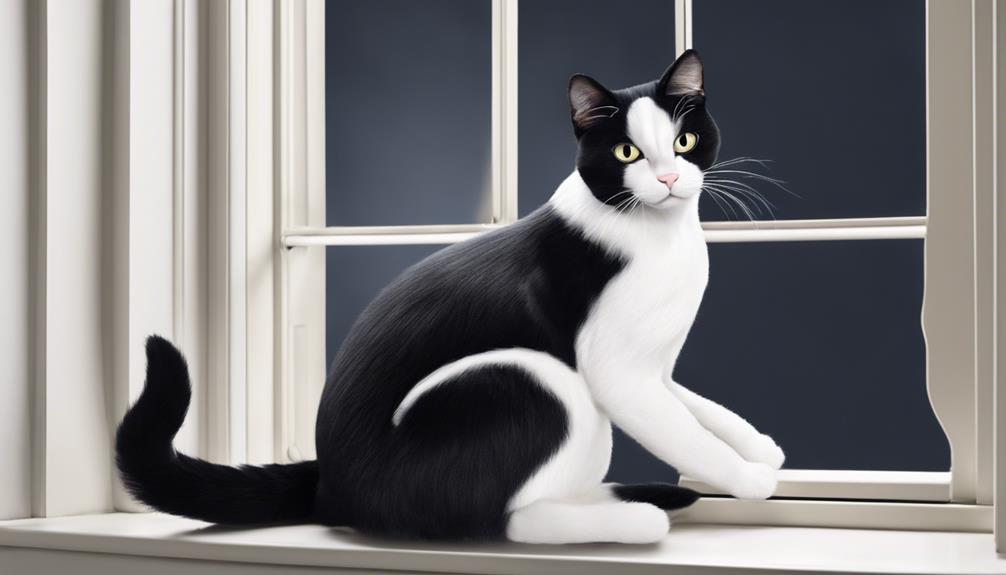
When searching for the perfect black and white cat breed, the Turkish Angora stands out with its luxurious long-haired coat, loving personality, and love for water activities. This breed features silky, shiny fur, well-proportioned bodies, and a lively attitude. Their fun-loving, sociable nature and high intelligence make them excellent companions. Regular grooming and interactive playtime are essential for their health and happiness. If you’re intrigued by the Turkish Angora’s distinctive characteristics, there is a lot more to learn about this charming breed’s temperament, adaptability, and suitability for different households.
Key Takeaways
- Maine Coon: Versatile with over 75 color combinations.
- Turkish Angora: Stunning black and white coats.
- Manx and Cymric: Playful, tailless breeds.
- Oriental Shorthair: Visually stunning patterns and colors.
- Scottish Fold: Unique charm with folded ears.
Maine Coon
Maine Coons, recognized as one of the largest domestic cat breeds, exhibit a striking appearance with their long, double coat and over 75 color combinations. These majestic felines can reach up to 16 inches in height and weigh between 9 to 17 pounds, making them a presence to behold in any home.
Their intelligence is remarkable, allowing them to adapt easily to various environments and situations. What truly sets Maine Coons apart is their dog-like personalities. They aren't your typical aloof cats; instead, they form deep bonds with their human companions, displaying loyalty and affection.
Maine Coons are like no other, enjoying interactive play and even walking on leads, showcasing their unique and adaptable nature. If you seek a feline friend with a regal presence, a loving heart, and a touch of playfulness, the Maine Coon might just be the perfect match for your family.
Cornish Rex
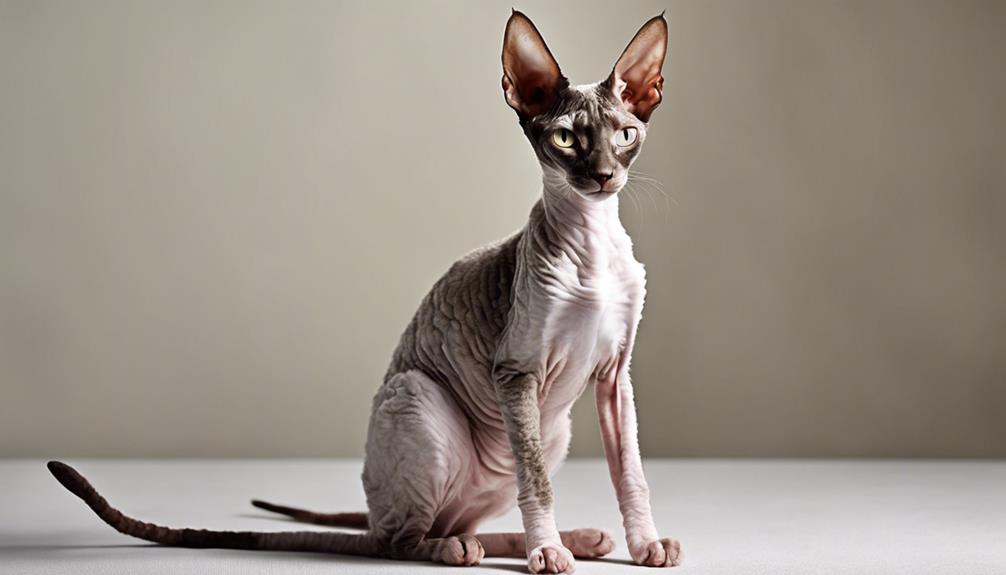
Cornish Rex cats sport unique curling coats that set them apart from other breeds, adding a touch of charm to their playful and affectionate personalities.
Their energetic nature and sociable demeanor make them delightful companions for families seeking an interactive and loving pet.
With a lifespan ranging from 10 to 16 years, these intelligent and engaging felines promise long-lasting joy and fun.
Unique Curling Coats
With their unique tight, curly coats, the Cornish Rex cats stand out among other breeds, making them a favorite among allergy sufferers and cat enthusiasts alike. Their hypoallergenic nature, thanks to minimal shedding and lower levels of the Fel d1 protein, appeals to those with sensitivities.
Not only do these cats offer a practical solution for allergy concerns, but their distinct coat texture provides a soft, velvety feel that's delightful to touch. The range of colors and patterns in which the Cornish Rex's coat comes adds to their striking appearance, making them visually enchanting.
Beyond their aesthetics, these cats are also known for their high activity levels and intelligence, requiring mental stimulation and playtime to keep them content and engaged.
Playful and Affectionate
We find Cornish Rex cats to be lively and affectionate companions, known for their playful nature and strong bonds with their human family. These black and white cat breeds aren't only energetic but also highly interactive, making them a joy to have around.
Their intelligence shines through as they enthusiastically participate in games and activities, always excited for engaging playtime. The unique coat of tight, curly hair adds to their charm, making them stand out in the feline world.
Their affection knows no bounds, forming deep connections with those they hold dear. With a Cornish Rex by your side, you can expect endless love, entertainment, and companionship.
Manx

Manx cats are renowned for their distinctive feature of being tailless or having short tails, a genetic trait that sets them apart from other feline breeds.
Their playful and affectionate nature makes them delightful companions, as they enjoy forming strong bonds with their human family members.
Additionally, Manx cats are known to be excellent jumpers, thanks to their powerful hind legs, and they're intelligent pets that quickly grasp new concepts, making them engaging and interactive companions.
Unique Tailless Feature
Renowned for their unique tailless feature, Manx cats display a special charm that distinguishes them from other breeds. This exceptional trait not only enhances their appeal but also boosts their leaping abilities, thanks to their strong hind legs.
The circular head and expressive eyes of the Manx cat contribute to their enchanting appearance, making them even more lovable. Despite their absence of a traditional tail, Manx cats are surprisingly nimble and playful, always eager for a game or a lively chase.
Their tailless nature adds an element of fascination to these already intriguing felines, making them a delightful addition to any family seeking a cat with a distinctive touch.
Playful and Affectionate
With their playful nature and affectionate demeanor, these tailless Manx cats are delightful companions for families seeking a loving feline friend. Manx cats' short tails and exceptional jumping abilities make them agile playmates, always ready for a game of chase or a pounce on their favorite toy.
Their sociable nature means they thrive on human interaction, forming strong bonds with their family members. Whether it's learning tricks or just cuddling up on the couch, Manx cats are intelligent and loving companions.
Available in various colors and patterns, including the classic black and white tuxedo look, these cats bring both charm and companionship to any home. If you're looking for a cat that's both playful and affectionate, the Manx breed might just be the perfect choice for you.
Munchkin

Recognized for their unique short legs that resemble those of Dachshunds, Munchkin cats are lively and spirited companions. These high-energy felines adore interactive play and are always ready for a game with kids, dogs, or their humans. Their mischievous personalities have earned them the nickname 'magpies', mirroring their playful nature and love for entertainment. Despite their shorter stature, Munchkins are surprisingly agile and skilled at keeping up with all the action.
Munchkin cats aren't only fun-loving but also enchanting and delightful, making them fantastic additions to any family. Their continual willingness to engage in play and entertain ensures that there's never a dull moment with these charming companions around. Whether it's chasing a toy or simply exploring their surroundings, Munchkins bring joy and liveliness to any household. With their lovable nature and playful antics, Munchkin cats are certain to capture the hearts of their owners and create lasting memories filled with laughter and fun.
Oriental Shorthair

Sleek-bodied with large ears and almond-shaped eyes, Oriental Shorthair cats come in a wide variety of patterns and colors, including striking black and white coats. These feline companions aren't only visually stunning but also possess inquisitive personalities that will keep you on your toes. Known for being chatty, Oriental Shorthairs love to communicate with their humans, making them great conversationalists in the house.
What sets them apart is their love for interactive play. Whether it's chasing after a feather toy or batting around a ball, these cats thrive on engaging activities that stimulate their minds and bodies. If you're looking for a cat that enjoys being part of the action and forming a strong bond with you, the Oriental Shorthair could be the perfect fit.
With their sleek appearance, expressive eyes, and playful demeanor, Oriental Shorthairs bring a lively energy into any home. If you're ready for a feline friend that loves to chat and play, consider adding an Oriental Shorthair to your family.
Persian

Moving from the discussion of Oriental Shorthair cats, we now shift our focus to the Persian breed. Persians are renowned for their glossy coats that require daily grooming due to their long length, making them strikingly beautiful cats. Their large mesmerizing eyes are enchanting and add to their charm.
What sets Persians apart is their docile nature; they're calm, affectionate, and enjoy spending time with their owners. These fluffy felines are true lap cats, seeking attention and affection from those they trust. Their placid temperament makes them ideal companions for individuals seeking a gentle and loving pet.
While Persians are generally calm and laid-back, they do require a time commitment for grooming to maintain their luxurious coats in top condition. If you're looking for a loving and affectionate furry friend that enjoys lounging around and being pampered, the Persian breed might be the perfect choice for you.
Scottish Fold
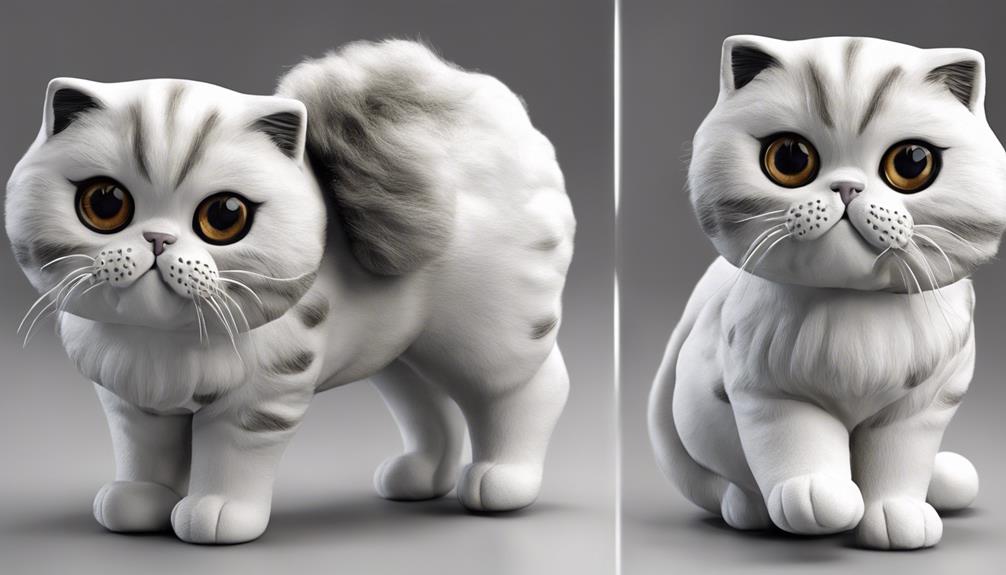
Scottish Folds are known for their distinctive folded ears that give them an adorable look.
These cats are playful and affectionate, forming strong bonds with their favorite human.
Their rounded features contribute to their unique charm, making them a popular choice among cat enthusiasts.
Unique Folded Ears
With their distinctive folded ears adding to their charming appearance, the Scottish Fold breed of cats is known for its unique feature that sets them apart from other feline companions. These folded ears are a result of a genetic mutation affecting cartilage development, giving Scottish Folds their signature look.
The rounded appearance of this breed, including their round head, eyes, and toes, complements the folded ears perfectly. Scottish Folds aren't only visually appealing but are also known for their loyalty and affectionate nature. They tend to form strong bonds with one person in the family, showing unwavering devotion.
Their sweet and gentle demeanor makes them wonderful companions for both families and individuals seeking a loving and devoted feline friend.
Playful and Affectionate
Exuding warmth and playfulness, these affectionate felines delight in forming strong bonds with their human companions. Scottish Fold cats, with their charming folded ears and rounded features, aren't only visually appealing but also incredibly loving and interactive. Here are three reasons why Scottish Folds make wonderful companions:
- Loyal Companions: These intelligent cats tend to bond closely with a specific person in the family, showing unwavering loyalty and affection.
- Playful Nature: Scottish Folds enjoy engaging in playtime, especially with toys that challenge their clever minds, making them a joy to interact with.
- Need for Human Connection: These affectionate cats can experience anxiety if left alone for extended periods, preferring the company and attention of their human friends.
Siberian Cat

Siberian cats, known for their semi-long fur coats and large paws, have a charming and fluffy appearance. This fluffy breed, also known as the Siberian Forest cat, is a popular choice for those seeking a cuddly companion. These cats are best suited for homes with outdoor access, where they can explore and roam freely. However, they may not be the ideal choice for city living or apartments due to their active nature and need for space.
Their super-soft fur adds to their appeal, making them gentle and observant companions. Siberian cats may exhibit pouncing behavior when engaged in play, showing their playful side. When they were brought to the UK in 2002, they captured the hearts of many with their striking looks and endearing personalities.
Turkish Angora

Let's talk about Turkish Angoras and what makes them unique.
These cats are known for their stunning longhaired coats that can come in black and white.
They aren't only beautiful but also affectionate and playful companions, making them a delightful addition to any household.
Turkish Angora Characteristics
The Turkish Angora, with its exquisite longhaired coat and affectionate nature, is a mesmerizing breed known for their intelligence and engaging personality. When considering this breed, keep in mind these key characteristics:
- Their soft, glistening fur and symmetrical bodies make Turkish Angoras visually striking.
- Turkish Angoras exhibit affectionate behavior towards their owners, enjoying interactive playtime with stimulating toys.
- These cats come in various colors, including the classic black and white pattern, showcasing their unique physical features.
Turkish Angoras aren't only beautiful but also intelligent and active, making them delightful companions. Their affinity for water-related activities adds an extra element of fun to their already charming personalities.
Turkish Angora Temperament
With their playful and active nature, Turkish Angoras exhibit an affectionate temperament that thrives on interaction with their owners. These cats are not only playful but also highly intelligent, making them a joy to have around. Their social nature means they enjoy being part of the family activities and will often seek out attention and companionship. Turkish Angoras are known for their love of water, adding an entertaining element to their already lively personalities. Additionally, their intelligence allows them to be trained to do tricks, showcasing their adaptability and quick learning abilities. If you're looking for a cat that is not only playful and active but also affectionate and intelligent, the Turkish Angora could be the perfect match for you.
| Playful | Affectionate | Intelligent |
|---|---|---|
| Yes | Yes | Yes |
Turkish Angora Care
Ensuring proper grooming practices is essential for maintaining the health and beauty of Turkish Angoras, especially considering their exquisite longhaired coats and active nature. When caring for a Turkish Angora, remember these key points:
- Regular Brushing: Their longhaired coats require frequent brushing to prevent mats and tangles, keeping their fur soft and glistening.
- Interactive Play: Engage in playtime activities to fulfill their need for mental stimulation and exercise, enhancing their affectionate nature.
- Color Varieties: Turkish Angoras come in various colors, such as the striking black and white combination, adding to their unique charm.
British Shorthair

Among the various black and white cat breeds discussed, one particularly stands out for its kind and easy-going personality – the British Shorthair. These cats are beloved for their dense coats and gentle temperament, making them perfect for family life. British Shorthairs are not only affectionate but also get along well with other pets, including dogs, and are great with children. Their laid-back nature and adaptability make them ideal companions for those seeking a loving feline friend. Below is a table summarizing key characteristics of the British Shorthair:
| Characteristic | Description |
|---|---|
| Coat | Dense and thick |
| Temperament | Gentle and easy-going |
| Suitability for Kids | Excellent; great with children |
| Adaptability | Able to adjust well to different environments |
British Shorthairs are not only beautiful with their black and white coats but also bring warmth and joy to any household they become a part of.
Cymric

Cymric, a long-haired cat variant of the Manx breed, is known for its unique tail characteristics, including being tailless or having stump tails. These felines are truly special companions, and here's why:
- Tailless Beauty: Cymrics' taillessness or short tails add to their charm and make them stand out among other cat breeds.
- Affectionate Personalities: Cymrics aren't just unique in appearance but also in their loving nature. They thrive on attention and are happiest when surrounded by affectionate humans.
- Legendary Tails: According to legend, the Cymric's tail story goes back to Noah's ark, where the Manx cats boarded last, and as the door closed, it caught their tails, resulting in them losing their length. This mythical tale adds an intriguing layer to these delightful feline companions.
Cymrics make wonderful pets for those seeking a loving and one-of-a-kind furry friend. Their affectionate demeanor and distinctive appearance make them perfect for individuals looking for a special bond with their feline companions.
Japanese Bobtail

Japanese Bobtail cats, known for their distinctive pom-pom tails, are revered as symbols of good luck in Japanese culture. These original lucky cats sport a charming mix of black, red, and white fur, adding to their unique allure. Believed to bring good luck to those who own them, Japanese Bobtails aren't just visually striking but also possess a special vocalization. Their sing-song meow is unlike any other, making them even more endearing companions. The playful nature of the Japanese Bobtail, combined with their elegant appearance, makes them a favorite among cat enthusiasts.
Their distinctive tails, resembling a waving pom-pom, are a standout feature that sets them apart from other breeds. This breed's history intertwined with Japanese folklore adds to their mystique. Whether you're drawn to their striking appearance or the promise of good fortune, Japanese Bobtails are sure to captivate you with their charm and unique vocalizations.
Siberian Forest Cat
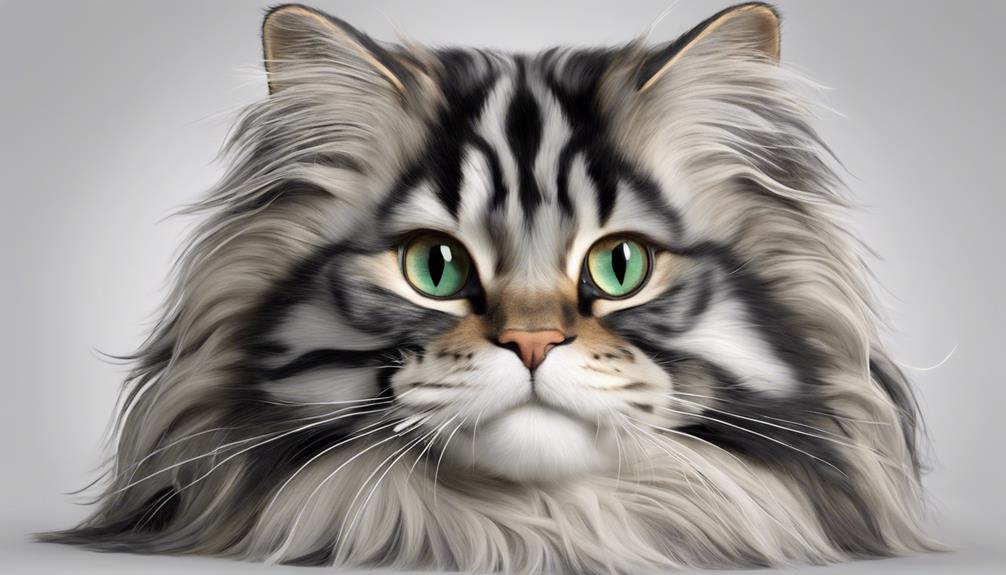
With their fluffy coats and large paws, Siberian Forest Cats are known for their distinctive physical features. These beautiful felines are best suited for homes with outdoor access, as they love to explore and roam in nature.
Here are some key points about Siberian Forest Cats:
- Active Nature: Siberian Forest Cats aren't ideal for city living or apartments due to their need for space and outdoor stimulation.
- Super-Soft Fur: One of the most appealing traits of the Siberian Forest Cat is their luxurious, soft fur, which makes them a joy to pet and cuddle.
- Independent Yet Affectionate: These cats strike a perfect balance between independence and affection. They enjoy their alone time but also appreciate snuggles and companionship.
If you're looking for a cat that embodies both elegance and a wild spirit, the Siberian Forest Cat might just be the perfect addition to your family.
Turkish Van

Known for their sturdy build and playful nature, Turkish Vans have a unique affinity for water. These sociable cats sport a distinctive van pattern, with a white body adorned with color spots, creating a beautiful coat pattern that's sure to catch your eye. Their love for water sets them apart from other breeds, making bath time an enjoyable experience rather than a dreaded task.
Turkish Vans aren't only known for their stunning appearance but also for their engaging personalities. They love interactive play and are always up for a game with their favorite humans. Their sociable nature makes them wonderful companions, as they enjoy spending time with their family members.
Whether they're chasing after toys or splashing in water, Turkish Vans bring joy and excitement into any home. With their unique coat pattern and playful demeanor, these cats are sure to capture your heart and keep you entertained for hours on end.
Ragamuffin
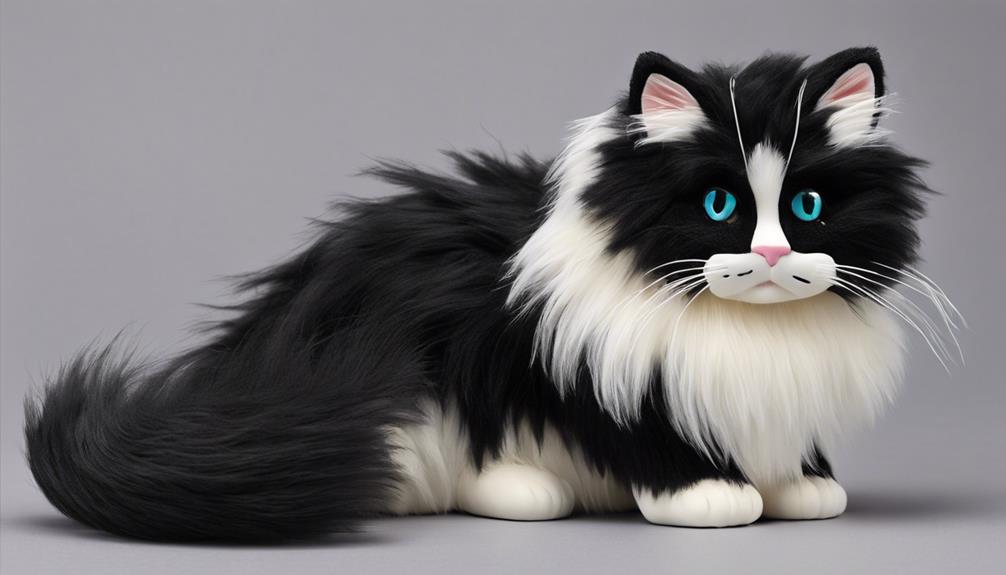
Cuddly and gentle, Ragamuffins are adored for their affectionate nature and playful demeanor. These large cats boast a rectangular balanced body structure, making them not only visually diverse with a variety of colors and patterns but also genetically healthy for long and happy companionship. Here are some key points to ponder about Ragamuffins:
- Affectionate Behavior: Ragamuffins are known for their loving and warm personalities. They enjoy spending time with their human companions, often seeking out cuddles and pets.
- Great Family Pets: Due to their friendly nature and sociable behavior, Ragamuffins make excellent family pets. They're gentle with children and are happy to be a part of the family activities.
- Long and Happy Companionship: With their robust genetics and strong health, Ragamuffins can provide many years of joy and friendship. Their playful antics and loyalty ensure a lasting bond that brings happiness to any household.
Frequently Asked Questions
What Breed Is My Cat if It's Black and White?
We love black and white cats! They can belong to various breeds like British Shorthair, Cymrics, Maine Coon, Munchkin, and Japanese Bobtail. Each breed offers unique traits, from kind personalities to cheeky playfulness.
Are Black and White Cats the Most Affectionate?
We believe black and white cats are among the most affectionate. They tend to seek love and attention, showing devotion through playful interactions. Their sweet and loving nature makes them cherished companions for those seeking a loyal and cuddly feline friend.
What Personality Does a Black and White Cat Have?
Black and white cats have a diverse range of personalities. From gentle and loyal to energetic and playful, they exhibit traits like affection, intelligence, and sociability. These feline companions can be great for various lifestyles.
Should I Get a Black and White Cat?
We should get a black and white cat if we're ready for commitment, love, and playful company. They bring joy and companionship, but remember to contemplate our lifestyle and ability to care for them properly first.
Are Black and White Cat Breeds Good for First-Time Owners?
Black and white cat breeds are ideal for first-time owners due to their even-temperament and low maintenance. Whether it’s the perfect orange white cat breed or any other variation, these cats are known for their sociable nature and adaptability to different living situations.
Conclusion
In the world of perfect black and white cat breeds, there are many options to choose from, each with their own unique characteristics and charm. Just like a beautiful piece of artwork, these feline companions bring a touch of elegance and sophistication to any home.
Whether you prefer the playful nature of a Maine Coon or the exotic look of a Turkish Van, there's a black and white cat breed out there waiting to capture your heart. Choose wisely and enjoy the beauty they bring to your life.
Paul’s love for animals knows no bounds. As a dedicated writer and animal lover, Paul brings a unique perspective to our team. His firsthand experiences with various animals enrich our content and provide valuable insights into their behavior and needs. Whether he’s sharing tips for pet care or shedding light on pressing conservation issues, Paul’s passion for animals shines through in everything he does.
Cats
Does My Cat Follow Me to the Bathroom?
Feline companionship in the bathroom: discover the reasons why cats follow you and deepen your bond with your furry friend.

When cats accompany you to the bathroom, it’s because they seek companionship, show affection, and care for you. This behavior helps strengthen the bond between you and your feline friend. Understanding their actions can deepen the connection you share. Cats find comfort and security in shared moments, like bathroom time, enhancing your relationship. By setting boundaries and creating a cat-friendly space, you can promote a harmonious coexistence. Tips for cat owners include designating a cozy area with interactive toys. Remember, cats follow you to the bathroom for various reasons, all stemming from their love and desire for closeness.
Key Takeaways
- Cats follow to the bathroom for protection, affection, and companionship.
- Bathroom time offers quality one-on-one interaction with cats.
- Following to the bathroom signifies closeness and affection.
- Cats seek attention and companionship during bathroom visits.
- Understanding and respecting cats' behavior enhances the bond during bathroom time.
Reasons for Cats Following to Bathroom
When cats accompany us to the bathroom, they often do so for reasons related to protection and affection. It might appear like a peculiar habit, but our feline friends have their motivations rooted in their unique cat behavior. For them, bathroom time isn't just a solitary activity; it's an opportunity for quality time with their beloved humans. Cats seek attention and companionship, and what better way to guarantee they've your undivided focus than by sticking close even in the bathroom?
Their curiosity and sense of exploration also play a role in this behavior. Cats are naturally inquisitive creatures, and they find comfort in being near their owners. The bathroom, with its closed doors and limited space, offers a cozy environment where cats can bond with their humans.
Understanding Your Cats Behavior

Cats displaying such behavior in the bathroom often showcase their unique ways of seeking closeness and forming connections with their owners. When your cat follows you to the bathroom, it's a sign of their affection and desire to be near you. Understanding why your cat exhibits this behavior can deepen your bond and address any underlying issues they may have. Cats may follow you to the bathroom because they seek attention, companionship, or simply enjoy your company. By recognizing these motivations, you can strengthen your relationship with your feline friend.
Observing your cat's behavior in the bathroom can provide insights into their emotional state and overall well-being. Ensuring a comfortable and safe environment in the bathroom for your cat is crucial to enhance their sense of security and relaxation. Paying attention to your cat's cues and responses during bathroom time can help foster a deeper connection and address any potential issues they may be facing. By understanding your cat's behavior, you can nurture a stronger bond based on trust and companionship.
Importance of Bathroom Bonding

Bathroom bonding with your cat is a valuable way to strengthen your relationship and create a deeper sense of companionship. Sharing bathroom time offers a unique opportunity for quality one-on-one interaction that can enhance your bond.
It's a moment where privacy meets companionship, allowing for a special connection with your feline friend.
Cats Curiosity in Bathroom
Exploring the bathroom with your feline companion can strengthen the bond between you and your cat. Cats are naturally curious creatures, and the bathroom provides a plethora of new sights, sounds, and smells for them to investigate. The enclosed space ignites their senses, making it an intriguing environment that sparks their interest.
Your cat's desire to follow you into the bathroom isn't just about companionship; it's about satisfying their curiosity and engaging with the world around them. By allowing your cat to join you in this space, you create opportunities for bonding and shared experiences, fostering a deeper connection between you both.
Embrace these moments of exploration with your cat to nurture your relationship and create lasting memories together in the bathroom.
Bonding During Daily Routine
Strengthening the bond with your feline friend through daily routines like bathroom time can enhance your relationship and deepen your connection. When you include your cat in these intimate moments, you're creating a special bond that goes beyond just being a pet owner. Here are some ways bathroom bonding can benefit your relationship:
- Sharing quiet moments together while you attend to your needs.
- Enjoying your cat's comforting presence as they curl up nearby.
- Engaging in playful interactions, like batting at a toy or receiving gentle headbutts.
- Experiencing mutual trust and vulnerability in a private space.
- Forming a daily ritual that strengthens your emotional connection.
Privacy Vs. Companionship
Understanding the balance between personal space and companionship is essential in fostering a strong bond with your cat during daily routines. When your cat follows you to the bathroom, it's not just about needing to be near you; it's also a way for them to seek companionship and show affection.
Bathroom visits provide a unique opportunity for your cat to connect with you on a deeper level, demonstrating their desire for closeness and connection. While privacy is often a cherished concept, the allure of companionship and bonding with their beloved owner outweighs the need for seclusion in the bathroom for cats.
Embrace these moments as a chance to strengthen your relationship with your feline friend and enjoy the special bond that forms during these intimate times.
Cats Perspective on Bathroom Time
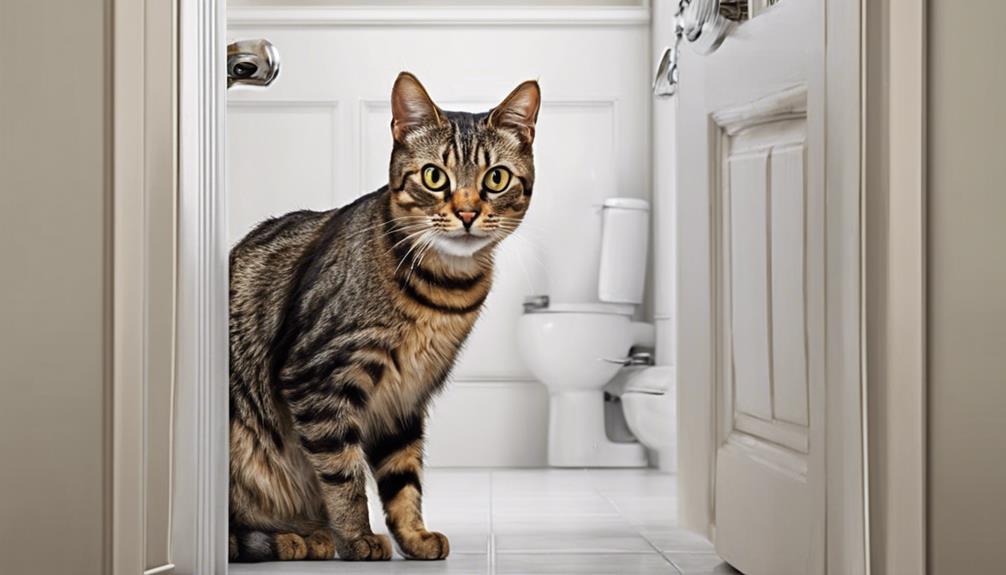
When it comes to your cat's perspective on bathroom time, it's important to understand their curiosity and need for attention. Cats often follow us to the bathroom seeking interaction and affection, making this a bonding moment for both parties.
Embracing these bathroom visits can strengthen the bond between you and your feline friend.
Cats Curiosity in Bathroom
Cats find the bathroom to be an captivating environment that stimulates their senses and curiosity.
- The rustling sound of a shower curtain can entice cats to investigate.
- The echo of their own meows in the tiled room can create a playful atmosphere.
- Sunlight streaming through a frosted window can cast mesmerizing patterns on the floor.
- The cool, sleek surfaces of the tiles offer a invigorating contrast to their fur.
- The absence of running water may prompt cats to search for the source of the intriguing sound elsewhere.
Cats Need for Attention
Entering the bathroom, we can observe how cats seek attention and affection from their owners in a desire for bonding moments. Your cat's need for attention becomes evident as they follow you into the bathroom, craving your companionship. This behavior showcases their love for you and their desire to be near you at all times.
Cats view bathroom time not only as a practical moment but also as an opportunity to connect with you on a deeper level. Offering them affection during these moments strengthens the bond between you and your feline friend. Understanding their need for attention during bathroom visits can help you nurture a more intimate and loving relationship with your cat.
Establishing Boundaries With Your Cat

To establish a harmonious relationship with your feline friend, setting clear boundaries is essential. When it comes to interacting with your cat, boundaries help create a respectful and communicative environment. Here are some tips on how to establish boundaries with your furry companion:
- Consistent Enforcement: By consistently enforcing boundaries, you teach your cat what behaviors are acceptable.
- Positive Reinforcement: Using positive reinforcement techniques like treats or praise can encourage your cat to respect boundaries.
- Designated Space: Providing a specific area for your cat can help reinforce boundaries and give them a sense of security.
- Firm Yet Gentle: It's important to establish boundaries with a firm but gentle tone to maintain a harmonious relationship with your cat.
- Communication: Clear communication with your cat owner is key in setting and maintaining boundaries effectively.
Creating a Cat-Friendly Environment

How can we enhance our bathroom space to cater to our feline companions' needs and preferences effectively? Creating a cat-friendly environment in the bathroom is crucial to make sure that our furry friends feel comfortable and secure in this shared space. Start by placing a cozy blanket or pillow for your cat to relax on, providing them with a soft and inviting spot to rest.
Introducing cat-friendly plants like cat grass or catnip can also help create a stimulating environment that appeals to your cat's natural instincts.
Additionally, consider installing shelves or perches in the bathroom to give your cat opportunities to explore and observe their surroundings from different heights. Interactive toys or puzzles can keep your cat entertained and engaged while in the bathroom, making it a more enjoyable experience for them.
To conclude, make sure the bathroom is a safe and secure space where your cat can feel at ease, knowing they've a comfortable retreat whenever they might follow you in.
Addressing Cats Protective Instincts

Comprehending cats' protective instincts strengthens our bond with them and guarantees their sense of responsibility for our well-being is acknowledged. Cats exhibit their protective instincts in various ways, showing their affection through actions that may seem peculiar to us:
- Following you to the bathroom: Cats see this as guarding their territory, which includes you, ensuring your safety.
- Purring and rubbing against you: These gestures aren't just displays of affection but also acts of protection, showing they care for your well-being.
- Keeping watch while you sleep: Cats often position themselves near you while you rest, standing guard to protect you.
- Alertness to unfamiliar noises: Cats' protective instincts make them vigilant, always ready to shield you from potential threats.
- Leaving 'gifts' at your doorstep: While sometimes unsettling, this behavior stems from their instinct to provide for and protect their loved ones.
Understanding and responding to these protective instincts can strengthen our connection with our feline companions and affirm their role as guardians in our lives.
Seeking Attention in Bathroom Visits

Cats seek attention in bathroom visits because they crave closeness, are curious about our routines, and desire interaction.
When our feline friends follow us to the bathroom, they see it as a prime opportunity to bond and be close to us.
Their need for companionship drives them to seek out these moments of togetherness.
Cats Need for Closeness
During bathroom visits, our feline companions seek attention and affection from us, demonstrating their need for closeness.
- Your cat may rub against your legs while you're using the bathroom, seeking physical contact.
- They might purr loudly to express contentment and a desire for closeness.
- Some cats may even try to sit on your lap or the bathroom sink to be closer to you.
- Their eyes may follow your every move, showing a genuine interest in your presence.
- By seeking attention in the bathroom, your cat is reaffirming the bond and love they feel towards you.
Curiosity About Routine
Our feline companions often exhibit a keen curiosity about our daily routines, particularly when it comes to our bathroom visits. Cats seek attention during these moments, using them as opportunities to bond with us.
Their interest in our bathroom routine may stem from a desire to engage with our activities and habits. When they follow us to the bathroom, they're showing affection and a fascination with our daily rituals. This behavior allows them to feel closer to us and be involved in our daily lives.
Desire for Interaction
Seeking attention and affection, our feline companions often accompany us to the bathroom to bond and engage with our daily routines. When your cat follows you in, it's a sign of their desire for interaction. Here's why they do it:
- They view bathroom visits as quality time to bond.
- Cats may meow, paw at the door, or follow you to express their desire for attention.
- The bathroom offers a calm environment for cats to engage with you.
- Cats enjoy being near their humans and strive to make sure they don't miss out on any affection.
- Bathroom time provides an opportunity for cats to connect with their owners in a quiet setting.
Valuing Human Company in Cats

Valuing human company is a significant aspect of a cat's behavior, as seen in their tendency to follow their owners to the bathroom. Cats view this time as an opportunity to be close to their beloved humans, seeking companionship and forming strong bonds.
When our feline friends choose to follow us, it's their way of showing affection and a desire to spend quality time together. The bathroom becomes a place of reassurance for cats, knowing that their human is nearby, which further solidifies the special connection between us and them.
Comfort and Security for Cats

Cats find comfort and security in following their owners to the bathroom. It's a place where they feel safe and at ease, seeking reassurance and companionship in this familiar environment. Here are some reasons why the bathroom offers cats a sense of comfort and security:
- The bathroom provides a quiet sanctuary for cats to relax and unwind.
- Cats enjoy the peaceful atmosphere of the bathroom, away from the hustle and bustle of the rest of the house.
- The enclosed space of the bathroom gives cats a sense of security, making them feel protected.
- The bathroom's consistent layout and familiar scents create a comforting environment for cats.
- Bonding with their owners in the bathroom helps cats feel connected and secure in their relationship.
Understanding the importance of the bathroom as a haven for cats can help strengthen the bond between you and your feline friend.
Bonding Through Bathroom Time

When cats join you in the bathroom, they're engaging in a bonding experience that strengthens the connection between you and your feline companion. It's a special time where your cat seeks companionship and closeness, showing their love and affection in a unique way.
As you go about your bathroom routine, your cat may follow you, wanting to be near and share those moments with you. This behavior is a way for them to deepen the bond you share, creating a sense of togetherness and security.
By allowing your cat to join you during these intimate moments, you're fostering a sense of trust and companionship that's essential for a strong relationship. Embrace these bathroom visits as opportunities to strengthen your connection with your furry friend, as they demonstrate their desire to be close to you and share in your daily experiences.
Bonding through bathroom time is a beautiful way to enhance the special bond you have with your cat.
Fostering Human-Feline Companionship

Seeking to strengthen the bond between humans and felines, spending time together in the bathroom can enhance companionship and mutual understanding. As we foster this connection, here are some ways to deepen the bond with our feline friends:
- Engage in gentle petting sessions, providing comfort and reassurance.
- Create a peaceful atmosphere with soft lighting and calming scents.
- Offer interactive toys for playful moments and mental stimulation.
- Share quiet moments of relaxation, allowing for peaceful coexistence.
- Provide treats and positive reinforcement to associate the bathroom with positive experiences.
Respecting Cats Motivations

To understand why cats follow us to the bathroom, it's essential to contemplate their natural instincts and social behaviors. As a cat parent, recognizing that your feline companion may follow you due to their need for attention and affection is vital. Cats are known for their independent nature, but they also seek connection and interaction with their human family members. Bathroom time presents an opportunity for bonding and quality time together, which your cat may enthusiastically embrace.
Additionally, some cats may follow you out of curiosity, wanting to explore new sights and smells in the bathroom. It's important to respect your cat's motivations and understand that their actions stem from a place of companionship and curiosity. By acknowledging and honoring these motivations, you can foster a deeper connection with your cat and alleviate any potential anxiety in cats that may arise from feeling separated from their beloved human.
Harmonious Coexistence With Cats

When sharing our living space with cats, it's important to understand that bathroom time can become a shared experience.
Our feline friends might see this as a moment to bond and show affection. Setting boundaries when necessary can help maintain a healthy and respectful relationship with our beloved cats.
Bathroom Buddies
In the bathroom, cats often exhibit their affectionate nature by following their owners. It's a time when they feel vulnerable and seek comfort in your presence.
Here are some ways to enhance your bathroom experience with your feline friend:
- Create a cozy spot: Provide a soft blanket or a comfortable perch for your cat to relax while you're in the bathroom.
- Offer gentle affection: Petting and talking softly to your cat can reassure them and strengthen your bond.
- Respect their boundaries: If your cat seems uncomfortable, give them space and let them decide if they want to stay or leave.
- Provide entertainment: Place some toys or a scratching post nearby to keep your cat occupied.
- Maintain a calm environment: Keep the atmosphere serene and peaceful to help your cat feel at ease.
Feline Space Invasion
Our feline friends often make their presence known in the bathroom, asserting their desire for closeness and companionship with us. Feline space invasion during bathroom visits is a common occurrence driven by our cats' innate need to be near us.
Cats view these moments as opportunities for bonding and quality time. Understanding and respecting this behavior can deepen the connection between you and your furry companion. However, if boundaries are necessary to maintain personal space, gentle training and redirection can help establish a harmonious coexistence.
Tips for Cat Owners

To enhance your cat's well-being and strengthen your bond, consider implementing these practical tips for cat owners.
- Create a Cat-Friendly Area: Designate a cozy spot in the bathroom with a soft blanket or bed where your cat can relax while you're in there.
- Interactive Toys: Keep some toys handy to engage your cat during bonding time in the bathroom.
- Pheromone Diffusers: Consider using pheromone diffusers to help your cat feel more secure and content in the bathroom space.
- Grooming Sessions: Use this time to groom your cat gently, reinforcing positive associations with bathroom visits.
- Positive Reinforcement: Reward your cat with treats or affection for good behavior during bathroom bonding time.
Frequently Asked Questions
Do Cats Follow You to the Bathroom to Protect You?
Yes, cats often follow us to the bathroom to protect and care for us. It's their way of showing affection and ensuring our safety. Offering a specific spot for guard duty outside the bathroom can reassure them.
Do Cats Know When You Go to the Bathroom?
We comprehend the curiosity surrounding feline behavior. Cats, with their keen senses, may indeed know when we head to the bathroom. Their sharp instincts and observations often lead to them following us, seeking connection and company.
What Does It Mean When Your Cat Follows You to the Bathroom?
When your cat follows you to the bathroom, it signals their affection and protective nature. They value your presence and seek reassurance of your well-being. It's a bonding moment, showing they care deeply for you.
Why Does My Cat Get Clingy When I Go to the Bathroom?
When we head to the bathroom, our cats can become clingy seeking attention and closeness. It's a cozy space where they feel secure. They view it as a bonding opportunity to be near us, showing their desire for companionship.
Is My Cat Following Me to the Bathroom Because It Hates Certain Smells?
Some smells cats hate may actually be the reason why your cat follows you to the bathroom. Cats have a keen sense of smell and certain scents may be unpleasant for them, causing them to seek out their owner for comfort and protection.
Conclusion
To sum up, remember that your furry friend may follow you to the bathroom for a variety of reasons. Understanding your cat's behavior and establishing boundaries can lead to a harmonious coexistence.
By fostering human-feline companionship and respecting your cat's motivations, you can strengthen your bond.
So next time your cat accompanies you to the bathroom, appreciate the opportunity for bathroom bonding, creating a calm and comforting atmosphere for both of you.
Paul’s love for animals knows no bounds. As a dedicated writer and animal lover, Paul brings a unique perspective to our team. His firsthand experiences with various animals enrich our content and provide valuable insights into their behavior and needs. Whether he’s sharing tips for pet care or shedding light on pressing conservation issues, Paul’s passion for animals shines through in everything he does.
-

 Vetted1 month ago
Vetted1 month ago15 Best Dog Food Brands Recommended by Vets for Healthy and Happy Pups
-

 Vetted1 month ago
Vetted1 month ago14 Best Homemade Dog Food Recipes Your Pup Will Love – Vet Approved & Nutritious
-
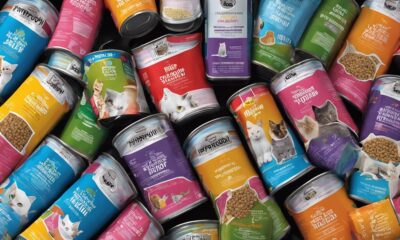
 Vetted1 month ago
Vetted1 month ago15 Best Cat Foods for Managing Hyperthyroidism – Vet Approved and Feline Friendly
-
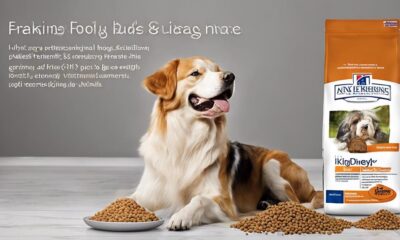
 Vetted3 weeks ago
Vetted3 weeks ago15 Best Dog Foods for Kidney Disease – Expert Recommendations for Your Pet's Health
-

 Vetted2 weeks ago
Vetted2 weeks ago15 Best Affordable Cat Foods That Won't Break the Bank
-

 Deers1 month ago
Deers1 month agoCaring for Baby Deer: Tips for Healthy Fawns
-

 Cats6 days ago
Cats6 days agoCat Weight Chart by Age: Kitten to Senior in Lbs
-
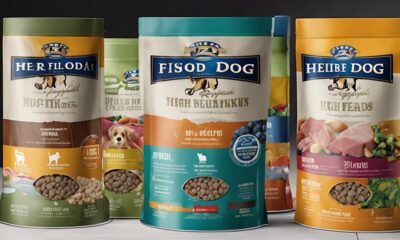
 Vetted1 month ago
Vetted1 month ago15 Best Kibble Dog Foods for a Healthy and Happy Pup




















